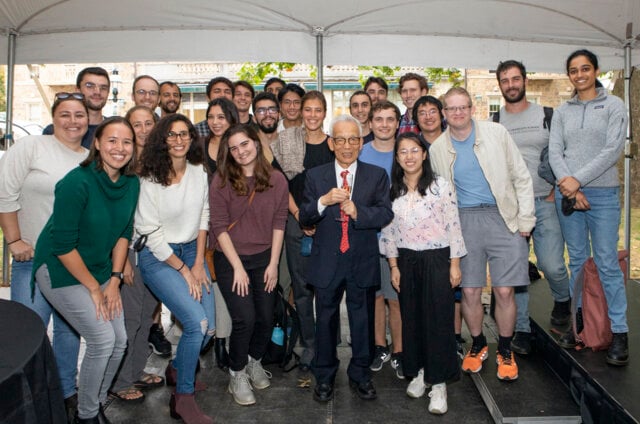Syukuro Manabe
Interview
Interview, March 2022

Syukuro Manabe celebrates with students, faculty and staff.
Photo: Princeton University, Office of Communications, Denise Applewhite (2021)
Nobelprize.org interviewed Syukuro Manabe on 16 March, 2022. He spoke about his endless curiosity, valuable life advice and the topic he has researched for the last six decades – climate change.
Telephone interview, October 2021
“Weather forecasting was more of an art, rather than science”
Telephone interview with Syukuro Manabe following the announcement of the 2021 Nobel Prize in Physics on 5 October 2021. The interviewer is Adam Smith, Chief Scientific Officer of Nobel Prize Outreach.
Establishing a firm scientific basis for predicting what will happen to the climate, and in the shorter term to weather, has been the challenge that has occupied Syukuro Manabe’s entire working life. In this interview, recorded amidst the happy chaos resulting from the early morning announcement of his Nobel Prize in Physics, Manabe reflects on the importance of fundamental research. As he says, “The prediction of climate change without accompanying understanding of it is no better than the prediction of a fortune teller.”
Interview transcript
Adam Smith: My name is Adam Smith from Nobelprize.org. Is it possible please to speak briefly with Professor Manabe?
Nobuko Manabe: Ah, just a second.
AS: Thank you.
Syukuro Manabe: Hello.
AS: Hello, yes, many, many congratulations on the award of the Nobel Prize.
SM: Thank you.
AS: There’s much excitement downstairs I can hear. Everybody’s very happy.
SM: Yeah, yeah, yeah. I never thought that I receive the Nobel Physics Prize for the work I have done long time, which I enjoyed very much, but I have been doing science of climate change. And when I look at all these former distinguished recipients, nobody received physics prize for my kind of work. And I really appreciate that the Swedish Academy of Science to choose this field – climate topics, climate change, which I enjoyed very much to do throughout my lengthy career which last more than 60 years, and so I am so surprised, but at the same time I dearly appreciate that Swedish Academy of Science choose my research for this honour of this year.
AS: I suppose they want to show how important a fundamental scientific understanding of the climate is.
SM: That’s right, yeah. I think one of the important things is understanding climate change. And what I did was, using climate model which I constructed, changing one thing at a time, just like a chemistry do a chemical, chemistry experiment, I made a numerical experiment using this model, changing one thing at a time, thereby understanding how climate system works, and how temperature change, how rainfall change, and why these changes result in the massive flooding which have been occurring near Beijing, and in Japan, and all this massive flooding. And how this very frequent drought has been occurring all over the world. I try to understand it using the climate model – why this is happening? I think, most important thing is understanding climate change. The prediction of climate change without accompanying understanding of it is no better than prediction of fortune teller.
AS: Such an important topic, such an important problem.
SM: Yeah.
AS: And almost everybody agrees about the importance of it, but tell me, why did you begin to be interested in meteorology and the climate in the first place? What drew you to the subject when you were young?
SM: Yeah, you know, it was, I went to graduate school of University of Tokyo. Then this graduate school for geophysics, I decided to focus on meteorology. At that time weather forecasting was more of an art, rather than science. You know, look at the past weather map and make a forecast based upon the sort of country and experience. But at that time at Institute of Advanced Study, Von Neumann, who is a pioneer of computers, among many other things, decided to do weather forecasting based upon laws of physics, which is the hydrodynamical equation, right? And so he started small groups and started studying weather forecasting. And this is the beginning of daily weather forecasting, which has become indispensable for our daily life.
AS: Over your career you’ve seen weather forecasting and climate prediction change from art to science. Amazing!
SM: Yeah.
AS: It’s been a pleasure to talk to you, and my congratulations.
Nobuko Manabe: Moshi moshi, Hi, hello?
AS: Hello, it’s Adam here.
NM: Okay, thank you.
AS: Thank you, and congratulations! What a day, what a day.
NM: Oh, thank you so much, thank you. Bye, bye.
AS: Bye.
Did you find any typos in this text? We would appreciate your assistance in identifying any errors and to let us know. Thank you for taking the time to report the errors by sending us an e-mail.
Nobel Prizes and laureates
Six prizes were awarded for achievements that have conferred the greatest benefit to humankind. The 14 laureates' work and discoveries range from quantum tunnelling to promoting democratic rights.
See them all presented here.
